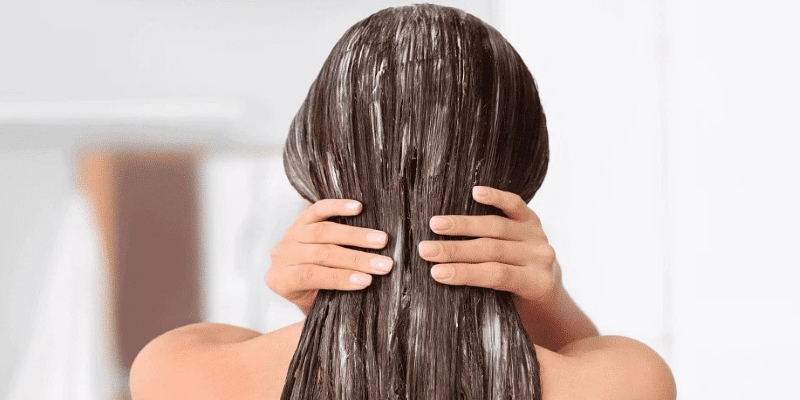Hair Mask vs Deep Conditioner: Which is Best for Smooth Hair
Jul 26, 2024 By Madison Evans
When it comes to achieving smooth, shiny hair, good hair care products can make all the difference. Two popular treatments are hair masks and deep conditioners, both promising to transform your tresses.

But is one better than the other for smooth hair? This article delves into the details of hair masks and deep conditioners, exploring their benefits and drawbacks and which one might be the best fit for your hair care routine.
Understanding Hair Mask

A hair mask is a deep conditioning treatment designed to nourish and hydrate the hair. Often enriched with a variety of ingredients such as oils, butter, and proteins, hair masks aim to penetrate deep into the hair shaft, providing intense moisture and repair. They are typically used less frequently than regular conditioners, usually once a week or bi-weekly. They are left on the hair for a longer period, ranging from five minutes to overnight, depending on the product and hair needs.
Pros and Cons of Hair Mask
Pros of Hair Mask
Intense Hydration: Hair masks are designed to provide deep hydration to the hair, making them especially beneficial for dry and damaged hair. Ingredients like oils, butter, and proteins penetrate deeply, restoring moisture and smoothness.
Repair and Strengthening: Hair masks often contain strengthening ingredients that help to repair and fortify the hair shaft. This can reduce breakage and split ends, promoting healthier and stronger hair over time.
Enhanced Shine and Smoothness: Hair masks' intense moisturizing properties can smooth the hair cuticle, reducing frizz and enhancing shine. This results in smoother, more manageable hair.
Nutrient-Rich Formulas: Hair masks are typically packed with beneficial ingredients such as minerals, vitamins, and antioxidants that nourish the hair and scalp and promote hair health.
Customization: Various hair masks are available to target specific hair concerns, such as color protection, hydration, repair, or volume. This allows users to choose a mask that best suits their individual hair needs.
Cons of Hair Mask
Time-consuming: Hair masks usually require a longer application time than regular conditioners. Depending on the product, you might need to leave the mask on for anywhere from five minutes to overnight, which can be inconvenient for those with busy schedules.
Heaviness: Some hair masks can be heavy and might weigh down fine or thin hair. This can make the hair look flat or greasy if not used appropriately or rinsed out thoroughly.
Potential for Buildup: Overusing hair masks or not rinsing them out properly can lead to product buildup. This can make the hair appear greasy, dull, or limp, counteracting the treatment's benefits.
Cost: High-quality hair masks can be more expensive than regular conditioners. Regular use can add up in terms of cost, especially if youre using premium or specialized products.
Incompatibility with Certain Hair Types: Not all hair masks are suitable for every hair type. For instance, a mask formulated for thick, curly hair might be too heavy for fine, straight hair. It's essential to choose a mask that matches your hair type and concerns.
Understanding Deep Conditioner

Deep conditioners are like regular conditioners but are formulated to provide more intense hydration and repair. They typically contain higher concentrations of conditioning agents and are designed to be left on the hair for a longer period, usually around 10-30 minutes. Deep conditioners aim to penetrate the hair shaft more deeply than regular conditioners, offering a more substantial moisturizing effect.
Pros and Cons of Deep Conditioner
Pros of Deep Conditioner
Effective Moisturization: Deep conditioners are designed to provide a higher level of moisture than regular conditioners. They can penetrate the hair shaft to deliver hydration, making hair softer and more manageable.
Improved Manageability: Regular use of deep conditioners can make hair easier to detangle and style. This is particularly beneficial for those with curly, thick, or textured hair that tends to tangle easily.
Damage Repair: Deep conditioners typically include ingredients that repair damage caused by heat chemical treatments, styling, and environmental stressors. They can strengthen hair, helping to reduce breakage and split ends.
Enhanced Smoothness and Shine: Deep conditioners' conditioning agents smooth the hair cuticle, reducing frizz and enhancing shine. This results in smoother, sleeker hair.
Versatility: Deep conditioners are suitable for various hair types and can be used more frequently than hair masks. They provide a quick and effective solution for maintaining hair health between more intensive treatments.
Cons of Deep Conditioner
Less Intense Than Hair Masks: While deep conditioners are effective, they may not provide as intense a treatment as hair masks. For severely dry or damaged hair, a hair mask might be necessary for more substantial hydration and repair.
Potential for Buildup: Like hair masks, deep conditioners can cause product buildup if not rinsed out thoroughly or if used too frequently. This can weigh down the hair and make it look greasy or dull.
Not Always Suitable for Fine Hair: Some deep conditioners can be too heavy for fine or thin hair, leading to a weighed-down, greasy appearance. It's essential to choose a formula that's appropriate for your hair type.
Need for Regular Use: Deep conditioners often need to be used regularly to maintain their benefits, which can be time-consuming. Skipping treatments can lead to a return of dryness and frizz.
Cost: While generally more affordable than hair masks, high-quality deep conditioners can still be a significant investment, especially if used frequently. This can add up over time, particularly for premium products.
Conclusion
So, is a hair mask or deep conditioner better for smooth hair? It depends on your hair's needs. A hair mask's intense moisturizing and repairing properties are ideal for extremely dry, damaged, or frizzy hair. A deep conditioner works well for regular, quick maintenance of smooth, manageable hair.
Using both treatments as needed and alternating them in your routine can provide optimal care for your hair. With the right products and patience, smooth, shiny hair is achievable.







